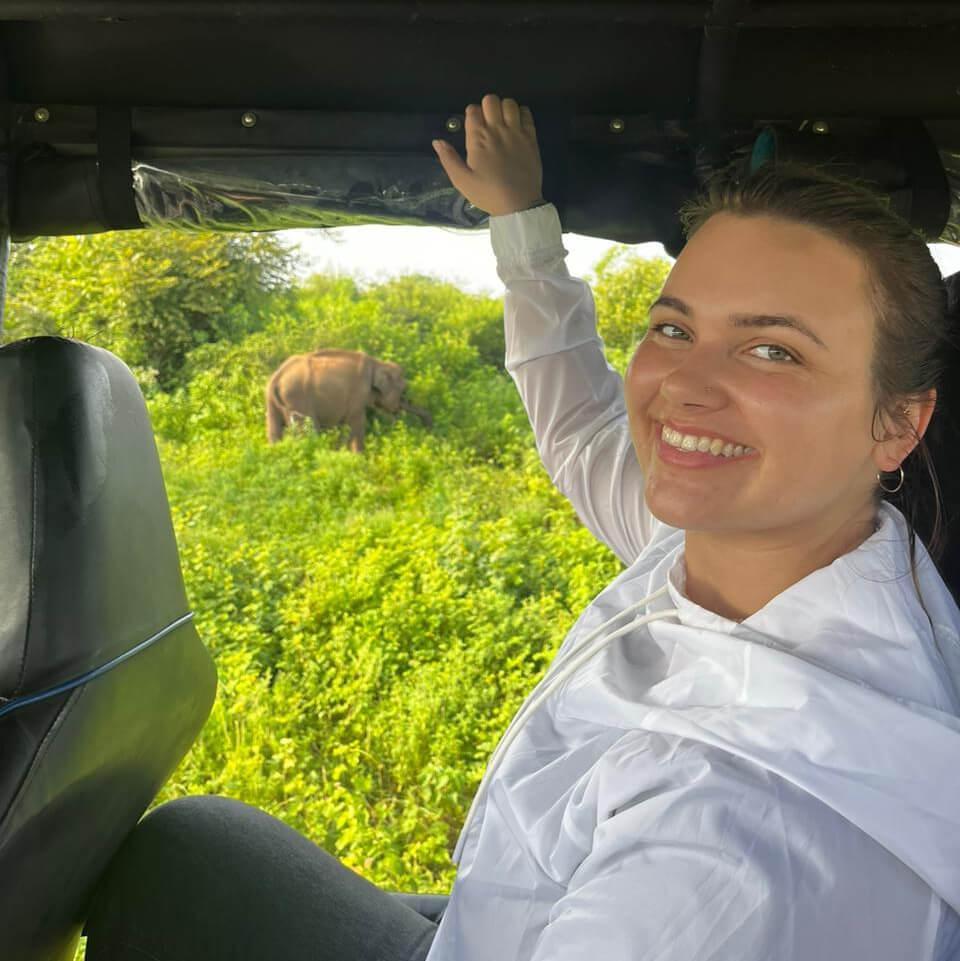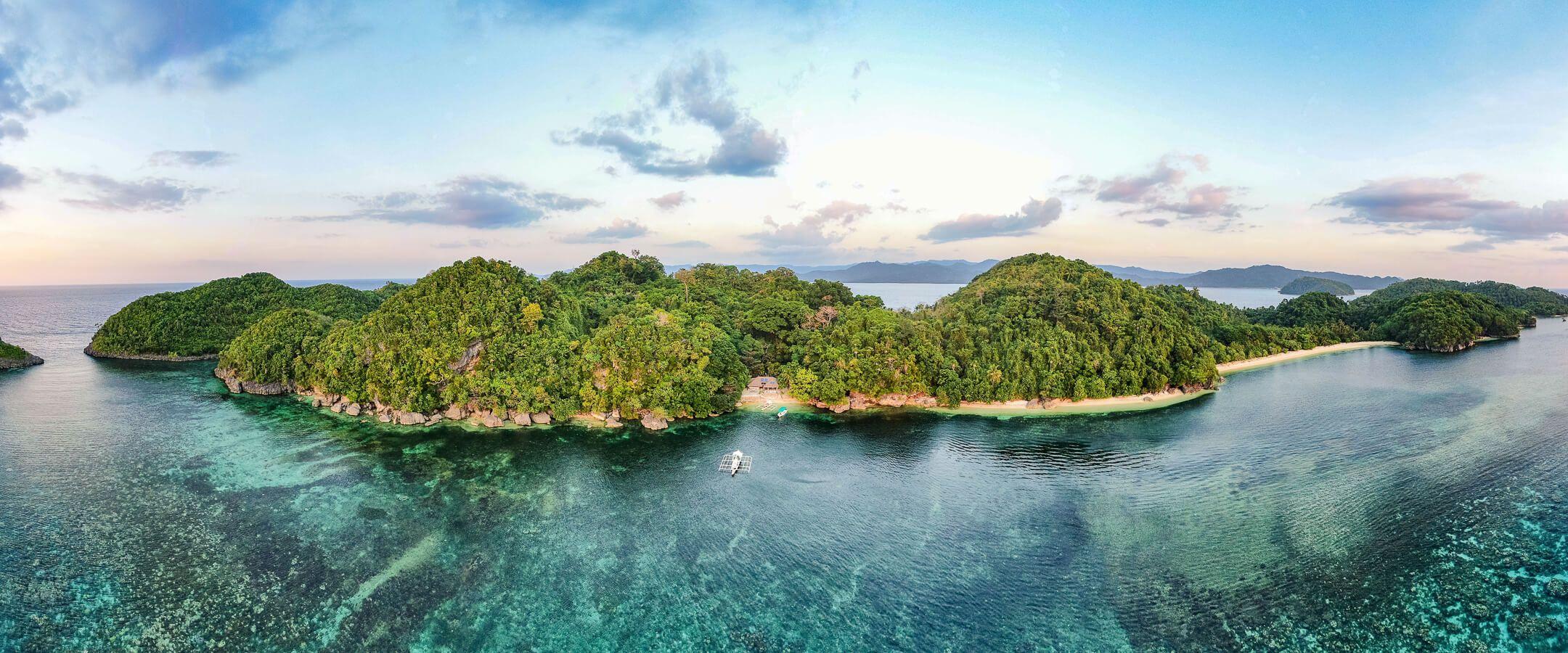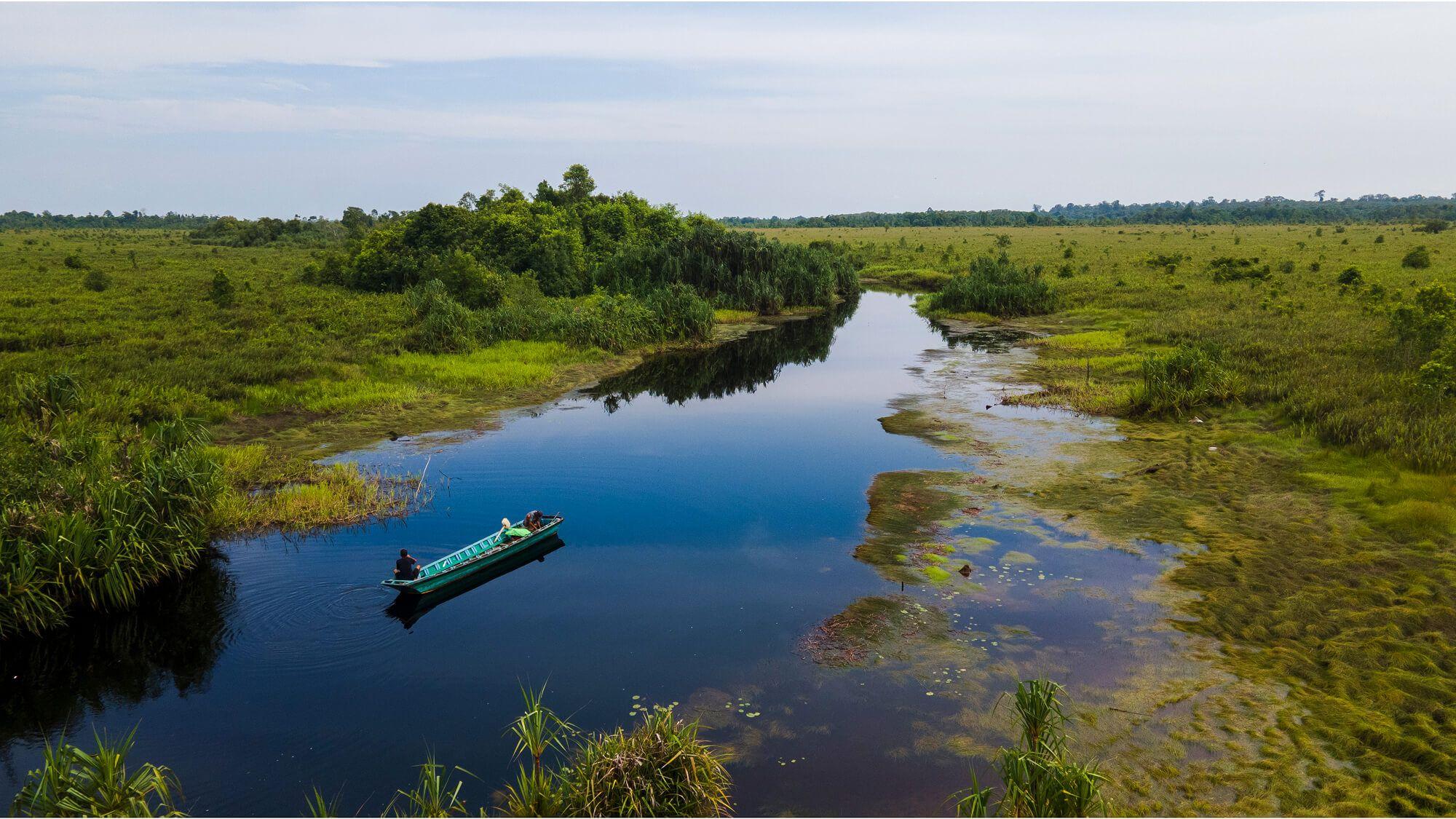Echoes of Ethical Tourism
In the stunning wilds of Sri Lanka, tourism is a key facet of the local economy. Hafsa Jamel and the Lanka Environment Fund are pioneering ethical, eco-friendly tourism practices throughout the country.
I’ve never felt closer to inner peace than on a brisk December morning in Udawalawe National Park. As birdsong and the sun's first rays engaged all of my senses, the whisper of a cool morning breeze rocked me into a gentle sleep. The sudden roar of our tour guide’s jeep startled me awake as we accelerated down a tight passage just off the park’s main road. Our guide had spotted an elephant mother and her calf and was rushing to make sure we had a prime viewing spot ahead of the other tourists.
In the blink of an eye, we were no longer alone in the wild. We’d found ourselves in the stunning presence of two beautiful elephants, as well as 50 other safari jeeps battling for the best viewing spot.
As beautiful as it all was, the chaotic scene made me question the true impact of tourism on Sri Lanka's natural wonders. While the thrill of spotting wildlife draws many to these parks, the rush to satisfy tourist expectations often comes at a cost.
Although it’s easy for tourists to take these experiences for granted, behind the scenes, there is a concerted effort to protect these natural treasures.
That’s where the work of dedicated individuals like Colombo resident Hafsa Jamel comes in.
Sustainably Driven, Lost Over Time
As an influential figure in eco-tourism and wildlife conservation, Hafsa works on critical initiatives at the Lanka Environment Fund (LEF), focusing on preserving the country’s terrestrial and marine environments. Their journey from assisting in Sri Lanka’s blue whale research to safeguarding Sri Lanka’s natural landscapes underscores the need for localised efforts for responsible tourism.
Hafsa’s career began in disaster risk management, interning on humanitarian projects in the aftermath of Sri Lanka’s civil war. “I’m a huge empath, and it ended up being a really difficult space for me to work in.” Their voice tinged with frustration, Hafsa reflected on Sri Lanka’s post-conflict rehabilitation—much of which has been halted by political figures who disregard their accountability. It left them questioning the broader humanitarian picture: “If those in power aren’t willing to take accountability, how will they do right by the people?”
Though Hafsa didn’t continue in humanitarian work, the themes of risk management and community resilience became foundational in their early career. The question of accountability lingered, especially as they witnessed a similar lack of responsibility in addressing environmental issues. Drawn to the natural world and its challenges, Hafsa took an internship in marine conservation, working on the unique identification of Sri Lankan blue whales.
“It was all just a matter of fate, really,” they said, “I always had an affinity for the environment but never saw myself entering this space.”
Sri Lanka’s whale populations are surprisingly unique, as they take up permanent residence in Sri Lanka’s waters and do not migrate to colder waters to feed. “These whales had figured out how to feed in our warm tropical waters, busting all the stereotypes we had built for them,” reflects Dr Asha de Vos, one of Hafsa’s first mentors and founder of Oceanswell, Sri Lanka’s first marine conservation research and education organisation.
Sri Lanka’s geology and climate allow these blue whales to stay close to the coast nearly year-round. This has made whale-watching a major attraction, with boats full of tourists now a familiar sight along the shorelines of Mirissa and Trincomalee, where resident pods can be found on both the Northern and Southern coasts.
Hafsa’s two-year involvement in marine research also broadened their focus, extending to fisheries management. As Hafsa delved into the complexities of overfishing and the mismanagement of Sri Lanka’s ocean resources, they recognised the need for a more nuanced approach.
A return to traditional, artisanal techniques—practices that had been sustainably driven but lost over time—could hold the key to more sustainable fisheries management in the future.
As Hafsa underscored the importance of integrating local, traditional methods, I wondered if this perspective would be a recurring theme in our discussion on sustainability in Sri Lanka.
In the end, they proved me right.
Tourism’s Strain on Wildlife
Today, Hafsa’s focus extends beyond the coastlines. As tourism surges—with 122 per cent growth compared to 2023—the strain on Sri Lanka's natural spaces, from marine environments to national parks, is becoming increasingly apparent.
“We’ve had a really tough five years in Sri Lanka, from the Easter attacks to COVID-19 to the economic collapse. This is the first year we’re seeing an increase in travel, and it’s influenced our areas of focus here at LEF,” Hafsa reflected. While this resurgence in tourism offers economic benefits, it also poses significant challenges to conserving these treasured landscapes and wildlife.
One of the most pressing issues is the pressure on wildlife from tourism-driven activities like whale watching and jeep safaris. Despite laws against swimming with whales without a proper licence, many operators flout these regulations to cater to tourist demands. “To keep tourists happy, we’re seeing a lot of illegal activity when it comes to whale watching and sea exploration, which really stresses the wildlife,” Hafsa sighed.
This concern is mirrored inland, where jeep drivers often bypass guidelines to give tourists the most thrilling experience at the cost of disturbing the animals’ natural behaviour.
Recognising these challenges, LEF supports organisations that focus on community-based opportunities for residents in buffer zones of national parks (NP), such as the Federation of Environmental Organisation (FEO). The FEO has projects involved in the management of NPs through habitat restoration, educational programs, and capacity building. For example, through their Nature Interpretation Programs, they focus on training local guides in more responsible tourism practices.
In Kumana National Park, for example, the FEO and Parrotfish Collective, a group of conservation communicators that Hafsa volunteers with, has been working with safari jeep drivers to educate them on the importance of preserving these delicate ecosystems.
“A lot of jeep drivers go into the park without guides due to understaffing. This causes stress for the animals because the drivers are focused on giving tourists the best experience, rather than following a set of training or guidelines.” The training sessions emphasise understanding the environment, the habits of the animals, and the need to manage tourist expectations responsibly.
As Hafsa detailed the practices of many jeep drivers in national parks, I reflected on my own safari tour experience. While it was startling to rush the elephants, I never felt malicious intent from our jeep’s driver or tour guide. Quite the opposite, as they engaged warmly with us and even shared homemade treats wrapped in innovative, eco-friendly packaging.
This experience highlighted a crucial point: it's not necessarily that local guides or communities lack concern for the environment, but rather that they often haven't been provided with proper training.
Community-Centred Conservation
LEF’s work extends beyond training manuals or policy influence; it’s about fostering deeper connections between communities and their environment.
Under the leadership of Vinod Malwatte, a key conservationist in Sri Lanka and Executive Director of the LEF, the organisation goes to great lengths to make opportunities accessible for grassroots groups around the country. “Vinod has this extraordinary ability to build relationships with people. As soon as an opportunity arises, he knows exactly who to call; he can always connect the right people to the needs on the ground.”
Driven by community engagement, LEF’s approach ensures that conservation efforts are not just top-down but rooted in the practices of those closest to the land.
“It’s not as easy as asking a local if they care about the environment,” Hafsa explains. “They’re used to it; it’s their day-to-day life. It’s not that they don’t care, but they’re so interconnected that caring about the environment comes naturally to them. How do they interact within these spaces in a sustainable way, and how do we encourage more of these good practices?”
Hafsa emphasises that bad practices have seeped into these communities over the years, more often than not, because of a lack of opportunity and locals wanting to improve their financial situations.
I feel a return to the start of our conversation, to the themes we explored during Hafsa’s time researching fisheries along the coast. Like the huge demand that led industrial fishing to overshadow traditional techniques, economic demand and opportunity have led those inland to depend on more extensive, sometimes invasive industries and practices.
Hafsa also seemed to recognise we’d come full circle. “It’s all related - and it’s really just about creating the systems and markets for locals to tap into, giving them an opportunity to work inside their community, inside their space.”
As the tourism industry continues to grow, Hafsa is hopeful that increased local involvement in tourist attractions and accommodation will create informed livelihood opportunities. They believe this shift will lead to a greater focus on sustainable, community-driven efforts rather than simply responding to international demand.
It’s all related - and it’s really just about creating the systems and markets for locals to tap into, giving them an opportunity to work inside their community, inside their space.
A Lasting Legacy
So, in the face of it all, where do we go from here?
With so many facets of our environment and global communities facing similar challenges, how do we measure progress in climate action?
“It’s daunting. You hear the bad stories and see climate headlines, and it can take such a toll on you,” Hafsa smiled softly. “But I really believe success is in the small wins.”
Hafsa’s experiences with marine life continue to shape their approach. “From the start of my career, I realised how important it is to have science-backed decisions… you can’t always move from an activist perspective,” they said. Hands-on fieldwork over the years has made them a better researcher and professional, helping them appreciate small victories and lead their projects with passion backed by data.
“There’s a lot of uncertainty, but it’s always good to come back to yourself and trust our day-to-day efforts will leave a positive impact on our environment.” Hafsa reflected, offering a glimpse into the quiet determination that drives their work.
Our connection to nature is as fragile as it is profound. It’s through the collective efforts of locals and conservationists like Hafsa that we can hope to preserve these moments of serenity for future generations. I sure hope so, at least.
Everyone deserves the chance to find their inner peace among the elephants.
Most Popular
The Climate Tribe delivers stories about Biodiversity and Conservation, Circular Economy, Food and Water , and how they intersect with climate.
Subscribe
Get the latest stories inspiring climate action around the globe straight to your inbox.





